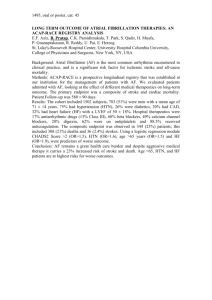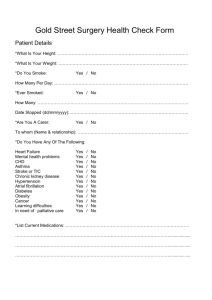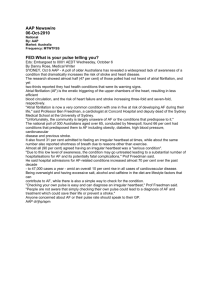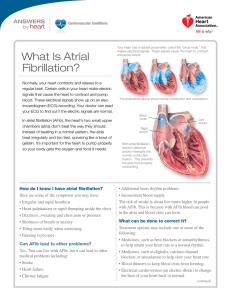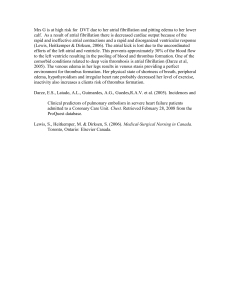Heart conditions - atrial fibrillation
advertisement
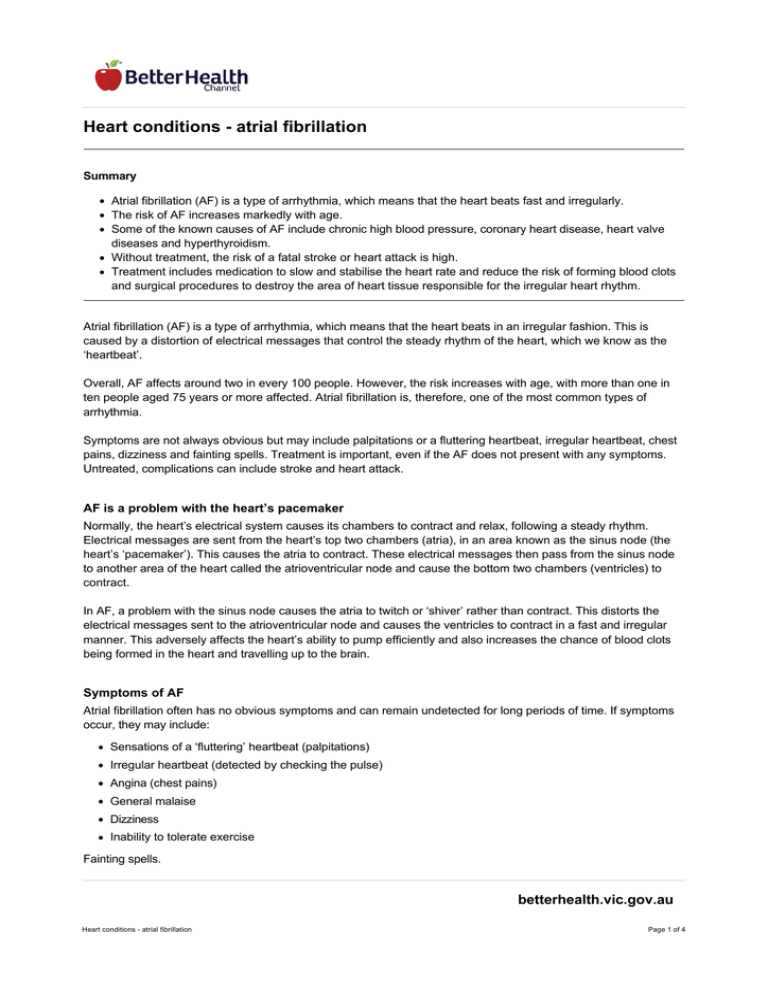
Heart conditions - atrial fibrillation Summary Atrial fibrillation (AF) is a type of arrhythmia, which means that the heart beats fast and irregularly. The risk of AF increases markedly with age. Some of the known causes of AF include chronic high blood pressure, coronary heart disease, heart valve diseases and hyperthyroidism. Without treatment, the risk of a fatal stroke or heart attack is high. Treatment includes medication to slow and stabilise the heart rate and reduce the risk of forming blood clots and surgical procedures to destroy the area of heart tissue responsible for the irregular heart rhythm. Atrial fibrillation (AF) is a type of arrhythmia, which means that the heart beats in an irregular fashion. This is caused by a distortion of electrical messages that control the steady rhythm of the heart, which we know as the ‘heartbeat’. Overall, AF affects around two in every 100 people. However, the risk increases with age, with more than one in ten people aged 75 years or more affected. Atrial fibrillation is, therefore, one of the most common types of arrhythmia. Symptoms are not always obvious but may include palpitations or a fluttering heartbeat, irregular heartbeat, chest pains, dizziness and fainting spells. Treatment is important, even if the AF does not present with any symptoms. Untreated, complications can include stroke and heart attack. AF is a problem with the heart’s pacemaker Normally, the heart’s electrical system causes its chambers to contract and relax, following a steady rhythm. Electrical messages are sent from the heart’s top two chambers (atria), in an area known as the sinus node (the heart’s ‘pacemaker’). This causes the atria to contract. These electrical messages then pass from the sinus node to another area of the heart called the atrioventricular node and cause the bottom two chambers (ventricles) to contract. In AF, a problem with the sinus node causes the atria to twitch or ‘shiver’ rather than contract. This distorts the electrical messages sent to the atrioventricular node and causes the ventricles to contract in a fast and irregular manner. This adversely affects the heart’s ability to pump efficiently and also increases the chance of blood clots being formed in the heart and travelling up to the brain. Symptoms of AF Atrial fibrillation often has no obvious symptoms and can remain undetected for long periods of time. If symptoms occur, they may include: Sensations of a ‘fluttering’ heartbeat (palpitations) Irregular heartbeat (detected by checking the pulse) Angina (chest pains) General malaise Dizziness Inability to tolerate exercise Fainting spells. betterhealth.vic.gov.au Heart conditions - atrial fibrillation Page 1 of 4 Types of AF The three main types of AF are: One-off – the heart has a single episode of irregular beating (this is sometimes due to excessive alcohol intake). Occasional – the heart is prone to repeat episodes of irregular beating, for short periods of time. This is known as ‘paroxysmal AF’. Persistent – the heart beats irregularly all the time. This is known as ‘permanent AF’, ‘sustained AF’ or ‘chronic AF’. Stroke is a possible complication More persistent types of AF are associated with an increased risk of stroke. A stroke can occur when an artery in the brain is blocked by a blood clot (embolus). People with AF are at increased risk of stroke because the irregularly beating atria are prone to developing blood clots. The incomplete contraction of the atria allows blood to pool, stagnate and congeal into a clot. A blood clot can break free from the atria and circulate in the bloodstream until it reaches a blood vessel in the brain. Untreated, the risk of stroke is quite high. Other risk factors (such as diabetes, hypertension or prior stroke) further increase the risk of stroke in people with AF. The risk of heart problems, such as heart attack and particularly heart failure, is also increased in people with AF. Causes of AF AF is commonly triggered by another chronic illness or event that irritates the heart. Some of the known causes of AF include: Chronic high blood pressure (hypertension) Coronary heart disease Heart valve diseases that interfere with the direction of blood flow in the heart Overactive thyroid gland (hyperthyroidism) Chest surgery Chest trauma Excessive intake of ‘social’ drugs such as caffeine and alcohol Certain prescribed drugs Certain illnesses such as pneumonia. Sometimes, a single cause cannot be found. The occurrence of AF increases with age (and, therefore, ageing of the heart), even without the above risk factors. Diagnosis of AF Tests used to diagnose AF may include: Physical examination Medical history A Holter monitor is portable and can record the electrical activity of the heart for a long period of time (for example, 24 hours) Electrocardiogram (a graph of the heart’s electrical activity) Echocardiogram (a special ultrasound of the heart) Blood tests Diagnostic scans of the legs or lungs (in the case of suspected blood clot) Cardiac catheterisation (in the case of suspected heart attack or coronary heart disease). betterhealth.vic.gov.au Heart conditions - atrial fibrillation Page 2 of 4 Treatment for AF Treatment depends on many factors including the severity of the condition, the person’s age and general health, and the benefits versus the risks of treatment. Generally speaking, the longer the person has been experiencing AF, the less effective non-invasive treatments (such as medications) will be. Treatment options may include: Medications to normalise the heart’s rhythm include digoxin, amiodarone and other ‘anti-arrhythmic’ agents. These may be given as injections or tablets. Since some medications may cause toxicity (poisoning), regular tests to check liver and thyroid function may be required. Medications to slow the heart rate include beta-blockers. Medications to reduce the risk of stroke. Blood-thinning medications (such as aspirin, clopidogrel, warfarin and some newer agents that have the potential to replace warfarin) are often prescribed to reduce the risk of blood clots developing in the heart in those with persistent forms of AF. Electric shock therapy to the heart (electrical cardioversion). Given under general anaesthesia, an electrical shock to the chest helps to ‘reset’ the heart’s electrical system. However, long-term medication may be needed to keep the heart beating normally. Surgery for AF Most people with AF respond to non-surgical forms of treatment. However, severe cases of AF that do not respond to medication or electric shocks may need to be surgically treated. Options include: Catheter ablation – in this procedure, a cardiologist first makes an incision in the upper thigh or groin. A thin tube (catheter) is inserted into a main blood vessel and pushed along until it reaches the heart. The tip of the catheter is fitted with an electrode. Once in position, the electrode is activated. Radio frequency waves destroy the small area of heart tissue responsible for causing the AF. Maze operation – this is a similar procedure to catheter ablation, but produces a ‘maze’ of small scars that ‘traps’ the source of atrial fibrillation and allows the sinus node to take control. Artificial pacemaker – in some cases, an artificial pacemaker is implanted. An artificial pacemaker helps to keep the heart in a regular rhythm. Changes to lifestyle with AF As described above, AF is strongly associated with coronary heart disease and hypertension (high blood pressure). Lifestyle changes can help to prevent and manage AF and reduce the risk of subsequent ill health (including a potentially fatal heart attack or stroke). Your doctor may suggest that you: Quit smoking Lose weight Cut back on alcohol Cut back on drinking coffee Switch to a low-fat, high-fibre diet Take measures to control high blood pressure or diabetes, if necessary Exercise regularly – but be advised by your doctor. For example, people taking warfarin are at increased risk of bleeding, so contact sports should be avoided Be aware of special dietary issues. For example, people on warfarin may need to limit the amount of green vegetables in their diet, because vitamin K can interfere with this medication. Other dietary cautions may be necessary. Seek advice from your doctor. Where to get help Your doctor Cardiologist Heart Foundation Tel. 1300 362 787 Medicines Line (Australia) Tel. 1300 MEDICINE (1300 633 424) – for information on prescription, over-thecounter and complementary medicines betterhealth.vic.gov.au Heart conditions - atrial fibrillation Page 3 of 4 Things to remember Atrial fibrillation (AF) is a type of arrhythmia, which means that the heart beats fast and irregularly. The risk of AF increases markedly with age. Some of the known causes of AF include chronic high blood pressure, coronary heart disease, heart valve diseases and hyperthyroidism. Without treatment, the risk of a fatal stroke or heart attack is high. Treatment includes medication to slow and stabilise the heart rate and reduce the risk of forming blood clots and surgical procedures to destroy the area of heart tissue responsible for the irregular heart rhythm. This page has been produced in consultation with and approved by: Baker IDI Heart and Diabetes Institute Content on this website is provided for education and information purposes only. Information about a therapy, service, product or treatment does not imply endorsement and is not intended to replace advice from your doctor or other registered health professional. Content has been prepared for Victorian residents and wider Australian audiences, and was accurate at the time of publication. Readers should note that, over time, currency and completeness of the information may change. All users are urged to always seek advice from a registered health care professional for diagnosis and answers to their medical questions. For the latest updates and more information, visit www.betterhealth.vic.gov.au Copyight © 1999/2016 State of Victoria. Reproduced from the Better Health Channel (www.betterhealth.vic.gov.au) at no cost with permission of the Victorian Minister for Health. Unauthorised reproduction and other uses comprised in the copyright are prohibited without permission. betterhealth.vic.gov.au Heart conditions - atrial fibrillation Page 4 of 4
